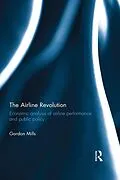When starting new airlines in response to government deregulation, entrepreneurs in the U.S. and Europe reduced some traditional service qualities (to reduce costs), concentrated on non-stop services between city pairs not already so connected, improved on-time performance, and offered low fares to win leisure travelers from the incumbents and to encourage more travel. The Airline Revolution will provide valuable economic analysis of this climate to students, airline professionals advancing to senior positions, public servants and others who provide advice to governments.
Autorentext
Gordon Mills is Honorary Professor of Economics at the University of Sydney. His academic experience has been leavened by consulting engagements in the UK and Australia, and by membership of some Australian Government committees.
Inhalt
PART ONE NEW AIRLINES AROUND THE WORLD
Chapter 1 The USA and Canada
Chapter 2 Deregulation and new airlines in Europe
Chapter 3 The Arabian Peninsula
Chapter 4 Asia
Chapter 5 Latin America
Chapter 6 Africa
Chapter 7 Australia: airline interactions in a small market
PART TWO THE AIRLINE INDUSTRY
Chapter 8 The revolution: airline operation and outcomes
Chapter 9 Contemporary practices in fare setting
Chapter 10 Airline entry and the processes of competition
Chapter 11 Regional services and route subsidies
Chapter 12 Airlines and airports
PART THREE CONCLUSIONS
Chapter 13 Airline prospects
Chapter 14 Public policy for airports and air navigation services
Chapter 15 Public policy on airlines
